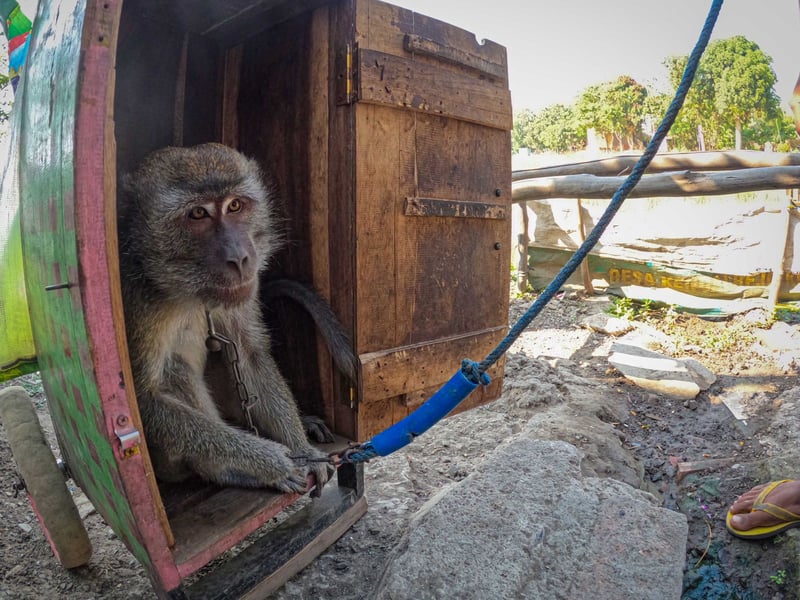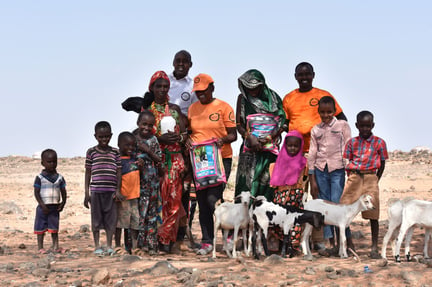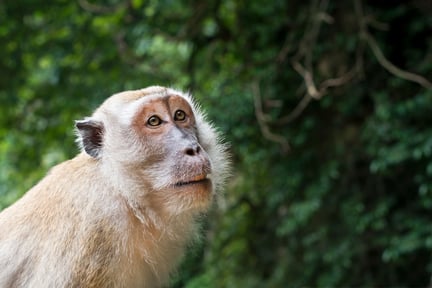
31 Macaques Rescued from Indonesia's Last Dancing Monkey Village in Major Animal Welfare Victory
News
The rescue operation, led by the Jakarta Animal Aid Network (JAAN) with support from World Animal Protection, marks a significant step toward ending the brutal practice of using monkeys for street performances.
In a critical breakthrough for animal rights, 31 long-tailed macaques have been rescued from Indonesia’s last remaining Topeng Monyet or “dancing monkey” village.
The rescued macaques were transferred from their handlers in Cirebon, West Java, a notorious center for monkey training, and relocated to JAAN's rehabilitation center in Cikole. Here, they will undergo an intensive rehabilitation program designed to restore their physical and mental well-being.
For many of these monkeys, this will be their first opportunity to experience freedom after being poached from the wild and forced into cruel training.
The Dark Reality of Topeng Monyet (Dancing Monkey) Practices in Indonesia
Topeng Monyet, which translates to "monkey mask," is a long-standing form of street entertainment in Indonesia. Young macaques, some as young as eight months old, are taken from the wild and subjected to harsh, abusive training designed to make them perform human-like acts.
Monkeys are chained by the neck, beaten, and starved until they obey commands to dance or walk on two legs, often while wearing costumes and masks. When not performing, these animals are confined in tiny, filthy cages, further adding to their distress.
Dr. Jan Schmidt-Burbach, Head of Animal Welfare and Research at World Animal Protection, highlighted the cruelty involved. "These monkeys have endured one of the cruellest training regimes imaginable. After being stolen from their mothers as babies and tortured for months, their living nightmare is finally over."
World Animal Protection, a leading animal welfare organisation, has played a crucial role in combatting the use of animals for entertainment worldwide. "We've already helped end bear dancing in countries like Greece, Turkey, India, and Nepal. Now we are one step closer to eliminating the barbaric practice of dancing monkeys in Indonesia," Schmidt-Burbach added.
Rehabilitation and Hope for a Future Free from Animal Cruelty
Now that these 31 macaques have been rescued, they are entering a critical rehabilitation phase. JAAN’s specialized program includes veterinary examinations, quarantine periods, and efforts to help the monkeys rediscover essential survival skills such as foraging and climbing.
Social bonding is also a priority - JAAN aims to reintroduce the monkeys as family units, fostering the connections that are crucial for their psychological well-being.
Femke den Haas, CEO of JAAN, expressed relief at the monkeys' newfound freedom. "Jono and Monon, two male macaques we rescued, have endured a life of suffering since they were infants. It's heartwarming to see their cages finally open, and their journey to a better life begin."
The rehabilitation process will take time. Each monkey will be quarantined for up to three months to monitor for disease and injuries, such as gunshot wounds - a common result of being poached from the wild.
But the ultimate goal is clear: to release these monkeys back into the wild where they belong.
The Fight to End Topeng Monyet in Indonesia
While the Indonesian Ministry of Forestry and Environment officially banned dancing monkey practices in 2019, enforcement has been slow. Cirebon remained the last stronghold for this cruel tradition, but the rescue of these 31 monkeys signals that change is on the horizon.
World Animal Protection and JAAN are also working with the Indonesian government to ensure former handlers can find alternative livelihoods that don't involve exploiting animals. Many handlers have chosen to enter professions such as selling toys, accessories, and food - a sustainable path forward that benefits both people and animals.
Long-tailed macaques are among the most exploited animals in Indonesia, frequently targeted for the entertainment, pet, and research industries. Their intelligence and social nature have sadly made them prime targets for abuse. Years of exploitation have even led to the species becoming endangered.
How You Can Help
World Animal Protection's ANZ office launched a fundraising appeal to support this rescue mission. Funds raised will go toward providing food, veterinary care, and the rehabilitation of the rescued monkeys.
To learn more and support these efforts, click here.
Understanding the scale of exploitation is the first step to help tackle it. Read the Bred for Profit Report to learn more about sentient animals being exploited worldwide, and what more can be done to help them.

